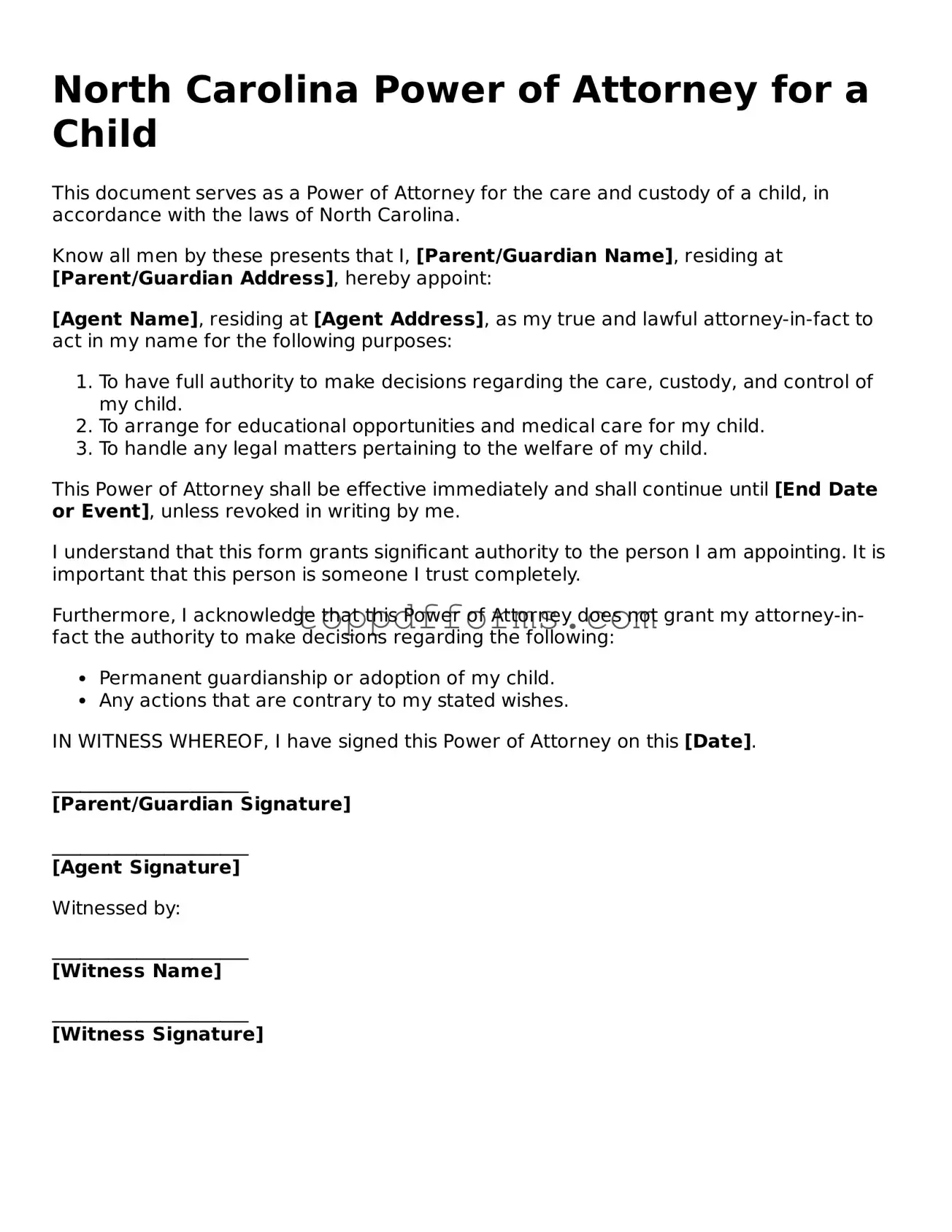Power of Attorney for a Child Document for North Carolina State
Things You Should Know About This Form
What is a Power of Attorney for a Child in North Carolina?
A Power of Attorney for a Child in North Carolina is a legal document that allows a parent or legal guardian to grant another adult the authority to make decisions on behalf of their child. This can include decisions related to education, healthcare, and general welfare. This document is particularly useful when parents are unable to care for their child temporarily, such as during a deployment, extended travel, or a medical emergency.
Who can be designated as an agent in the Power of Attorney for a Child?
The agent, also known as the attorney-in-fact, can be any responsible adult that the parent or guardian trusts. This could be a relative, family friend, or even a neighbor. It's important to choose someone who understands your values and is willing to take on the responsibilities associated with caring for your child.
How long is the Power of Attorney for a Child valid?
The Power of Attorney for a Child remains in effect until the specified time period expires, or until it is revoked by the parent or guardian. Parents can choose to set a specific duration for the authority granted or can make it effective until a certain event occurs, such as the parent's return from a trip. If no end date is specified, it typically lasts until the child reaches the age of 18.
Do I need to have the Power of Attorney for a Child notarized?
Yes, in North Carolina, the Power of Attorney for a Child must be signed in the presence of a notary public. This step helps to ensure the document's validity and provides an additional layer of protection against potential disputes. Having the document notarized also confirms that the signatures are genuine and that the parties involved understand the nature of the agreement.
Can the Power of Attorney for a Child be revoked?
Absolutely. A parent or legal guardian can revoke the Power of Attorney for a Child at any time, as long as they are of sound mind and able to make decisions. To do this, it is advisable to provide written notice to the agent and any relevant parties, such as schools or healthcare providers, to ensure that everyone is aware of the change. This helps prevent any confusion regarding who has authority over the child.
PDF Overview
| Fact Name | Details |
|---|---|
| Purpose | The North Carolina Power of Attorney for a Child form allows a parent or legal guardian to designate another adult to make decisions for their child. |
| Governing Law | This form is governed by North Carolina General Statutes, Chapter 32A. |
| Duration | The authority granted under this form is typically valid for up to one year unless revoked earlier. |
| Required Signatures | The form must be signed by the parent or legal guardian and acknowledged by a notary public. |
| Limitations | The designated agent cannot make decisions regarding the child's education without additional authority. |
Common mistakes
Filling out the North Carolina Power of Attorney for a Child form can be a straightforward process, but many people make common mistakes that can lead to complications. One significant error is failing to provide complete information. Each section of the form requires specific details about both the child and the agent. Incomplete information can cause delays or even invalidate the document.
Another mistake is neglecting to sign and date the form properly. Both the parent and the agent must sign the document. If either party forgets to sign or fails to date the form, it may not be recognized by schools, medical facilities, or other institutions. Always double-check for signatures and dates before submitting the form.
Additionally, some individuals overlook the need for notarization. In North Carolina, a Power of Attorney for a Child must be notarized to be legally binding. Failing to have the document notarized can render it ineffective. It’s essential to visit a notary public to ensure that the form meets all legal requirements.
Another common error is not specifying the duration of the power of attorney. The form should clearly state how long the authority is granted. Without a defined timeframe, there may be confusion about when the agent's authority begins and ends. This can lead to disputes or misunderstandings in the future.
People also sometimes choose an inappropriate agent. It’s vital to select someone who is trustworthy and capable of making decisions in the child’s best interest. Picking someone without considering their ability to fulfill the role can lead to problems later on.
Lastly, failing to communicate with the child about the arrangement can create emotional distress. Children should be informed about who will be responsible for them and why. Open communication helps to alleviate any fears or confusion they may have regarding the situation.
Other Common State-specific Power of Attorney for a Child Forms
How to Get Power of Attorney in Ohio for Elderly Parent - Keep a copy of the Power of Attorney in an accessible location for quick access.
In addition to the importance of having the Texas RV Bill of Sale filled out, you can also find helpful resources to assist you in this process, such as PDF Templates that provide customizable options to ensure all necessary information is accurately captured before finalizing the sale.
Financial Power of Attorney California - This Power of Attorney can give grandparents or relatives the authority to help care for a child.
Temporary Poa for Child - Gives flexibility to parents in appointing trusted caregivers.
How Do I Get Power of Attorney in Florida - A Power of Attorney for a Child ensures your child's needs are met when you can't be present.
